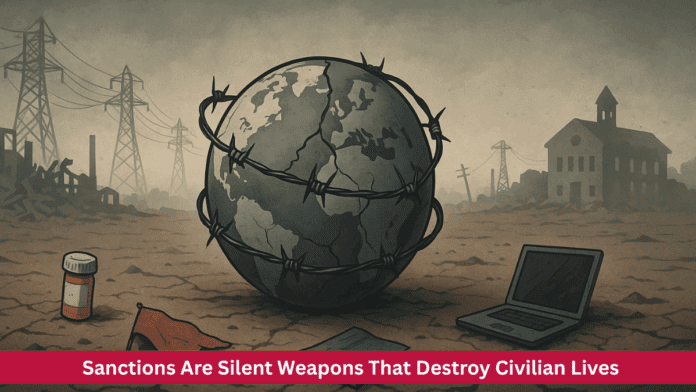While bombs destroy buildings and invasions make headlines, economic sanctions often do something quieter—but just as harmful. They slowly tear apart lives. Promoted as “peaceful” or “non-violent”, sanctions are actually powerful weapons. Instead of targeting governments or leaders, they mostly affect regular people—children, workers, students, and the sick.
Economic Sanctions Are Not Peaceful—They Hurt Real People
In countries like Iran, Venezuela, and Palestine’s Gaza Strip, families live with the daily pain of these restrictions. They lose access to basic needs like food, medicine, electricity, and education. Though these countries have different cultures and politics, they all share one thing: their people suffer deeply under sanctions.
In Iran, for example, years of U.S. sanctions have made it difficult to import life-saving medicines. Hospitals struggle to treat cancer and chronic diseases. Pharmacies run out of drugs. Many families can’t find or afford treatment. Even though humanitarian goods are supposed to be allowed, financial restrictions block payments, making trade nearly impossible.
Students and researchers also face roadblocks. Iran’s access to online academic platforms and digital tools is limited by sanctions. This has made education harder and isolated the country’s young people from the rest of the world. Without access to modern resources, both innovation and progress suffer.
????️ Sanctions Busted? Tiny Georgia Floods EU with Oil It Doesn’t Even Produce
When Healthcare Collapses and Food Vanishes
Sanctions don’t just stop people from buying goods—they collapse entire systems. Venezuela is a clear example. Once among the richest countries in Latin America, Venezuela has seen its hospitals run out of basic supplies. Between 2017 and 2018, thousands died from treatable conditions because medicine and equipment couldn’t reach those in need.
Supermarket shelves emptied, and food prices skyrocketed. Parents skipped meals so their children could eat. In many areas, clean water became rare. All of this happened not because of war but because of financial and trade restrictions imposed from abroad.
Gaza faces a similar fate. For over a decade, strict sanctions and blockades have controlled what can enter and leave the area. Power outages are common, making hospitals unreliable. Doctors perform surgeries in the dark or by flashlight. People go days without clean water. Children grow up surrounded by suffering—not because of local policy decisions, but because of outside pressure.
These are not rare cases. In many sanctioned countries, the working class suffers the most. While a wealthy few may find ways to bypass restrictions, the majority deal with rising costs, job losses, and limited public services. Sanctions don’t just punish governments—they punish whole populations.
Global Inequality Grows Through Economic Control
Sanctions are often presented as tools for justice. But in reality, they deepen global inequality. Powerful countries use them to pressure weaker nations into obedience. While promoted as strategies to protect democracy or human rights, they often violate those very principles.
Most sanctions are imposed without agreement from international bodies like the United Nations. Experts have called these “unilateral” sanctions a form of collective punishment. They harm innocent people and restrict countries from making their own choices about health, economy, and education.
Instead of promoting reform, sanctions can actually strengthen the grip of powerful elites inside those countries. With fewer legal options for trade, black markets grow. Those with access to smuggling routes or foreign currency become richer, while ordinary citizens fall deeper into poverty.
In much of the Global South—Asia, Latin America, and the Middle East—people do not see sanctions as peaceful. They see them as control. They replace tanks and bombs with hunger and illness.
People do not forget the sound of an empty pharmacy or the silence of a classroom without books or internet. These are the real voices of economic war. And though the pain is far from the decision-makers in Washington or Brussels, its impact is felt clearly in places like Tehran, Caracas, and Gaza.
